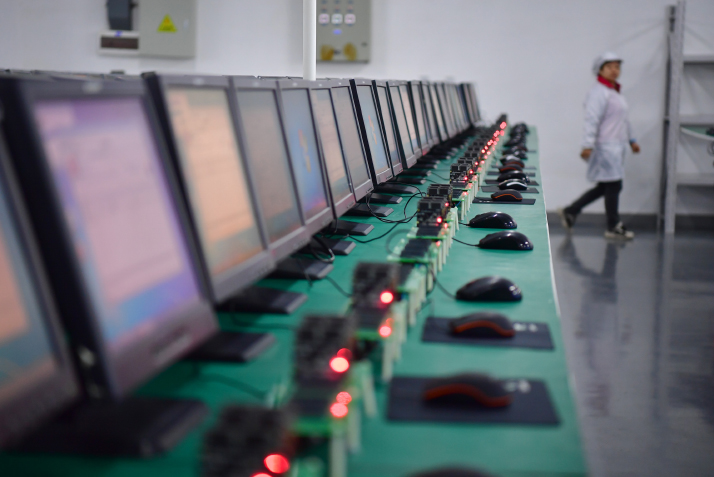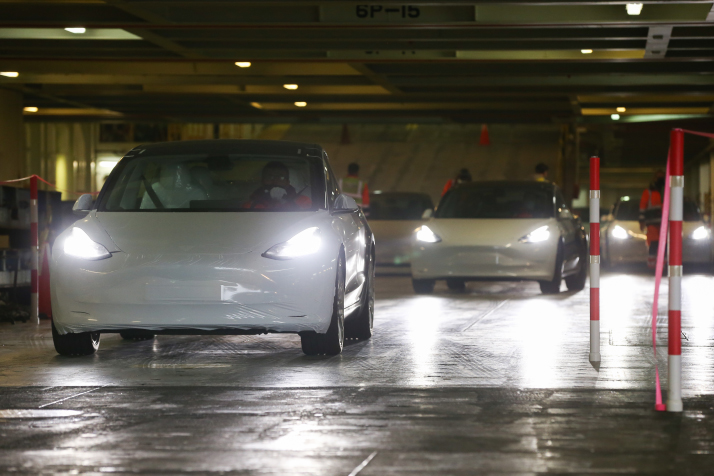| Business |
| New Export Control Law fights trade protectionism to safeguard national security | |
|
|
 Memory chips are tested in a workshop in Xi'an, Shaanxi Province in northwest China, on December 2, 2020 (XINHUA)
Though China's new Export Control Law came into force at the end of last year, on December 1, 2020, its coming was anticipated earlier. In November, the prices of rare earth elements, of which China is the largest exporter in the world, had jumped in anticipation of possible restrictions once the law took effect. Rare earth elements are used to manufacture electronic items such as smartphones. Japan, the U.S. and some European countries buy large quantities of rare earth from China because they need them for advanced manufacturing, and they are afraid that they will find it harder to import rare earth from China after new regulations are in place, Zhou Shijian, former Vice President of the China Chamber of Commerce of Metals, Minerals and Chemicals Importers and Exporters, told the Global Times newspaper. Drafted in 2017 and adopted by the Standing Committee of the National People's Congress on October 17, 2020, the new law extends to the export of controlled items in line with international practices. It covers nuclear materials, military products and dual-use items that can serve both civil and defense sectors, as well as services, technologies and data. Also, goods, technologies, or services that may endanger national security or national interests, may be used for producing weapons of mass destruction or may be used for terrorist objectives will be restricted. Purpose of the law Analysts have called it a defense against abuse by any country or region whose export controls threaten China's national security and interests. "With the implementation of the law, China can better fulfill its international obligation and safeguard its national security and interests, especially by regulating the export of technologies and data. The law also encourages international cooperation and exchanges on the control of exports," Cui Fan, a professor with the University of International Business and Economics, told Beijing Review. An important factor about the new law is that it goes beyond China's territory. Its obligations and penalties apply to exporters based in China as well as buyers and end-users outside China and intermediary service providers such as freight forwarders. The export control authorities will update the control lists and catalogues regularly. Goods, technologies, and services not on the lists may be controlled by the authorities on a temporary basis for two years at the most before they assess if these should be included in the lists. The authorities will also control the cross-border transit, trans-shipment, and re-export of controlled items or the export of controlled items from bonded areas, export processing zones and other areas subject to special customs supervision. For violations, the penalties range from warnings and fines from 100,000 yuan ($15,109) to 5 million yuan ($755,857), or up to 10 times the gains made from the illegal activities, to being blacklisted. Third parties that provide services to violators, such as shipping, delivery and customs clearance, knowingly, face various penalties, from warnings to fines. Fu Cong, Director General of the Arms Control Department of the Ministry of Foreign Affairs, said at a conference on non-proliferation in Asia on December 9, 2020 that the new law has developed unified standards for regulating exports based on international practices. Since the 1990s, China has formulated six administrative regulations on non-proliferation of nuclear, biological, chemical, missile and military products and export control of military products.  Workers transfer Tesla cars made in its gigafactory in China at Zeebrugge Port, Belgium, on November 27, 2020 (XINHUA)
International practice The new law "appears to be setting the legal ground for Chinese authorities to fight back against the export control measures recently adopted by the U.S., which have targeted leading Chinese companies, such as Huawei Technologies and the Semiconductor Manufacturing International Corp.," Dezan Shira and Associates, a pan-Asia business advisory firm, said in their China briefing in November 2020. The briefing quoted the law that said, "If any country or region abuses export control measures to endanger the national security and interests of the People's Republic of China, the People's Republic of China may, based on the actual situation, take reciprocal measures against that country or region." It interpreted the provision as revealing "the Chinese Government's intention to adopt any measure deemed appropriate to respond to export restrictions set by other countries toward China." The briefing also referred to the EU planning control of export of certain technologies, especially dual-use technologies. The planned regulation will make it mandatory for companies to have a license to export such items. "China's Export Control Law appears, again, as a means through which China can safeguard its interests and ensure reciprocity against other countries' export control policies," the briefing said. "Thus, to assess the impact of the law at the international level, it will be necessary to monitor the relationships among China, the U.S., and the EU, as well as other countries and regions since it is already clear that the Export Control Law covers enterprises (and individuals) located both in China and abroad." Experts also point out the existence of export control agreements that remain heavily skewed against China. For example, in 1996, a multilateral arrangement on export controls for conventional weapons and sensitive dual-use goods and technologies was signed by 33 co-founding countries and became operational the same year. Known as the Wassenaar Arrangement, it currently has 42 members excluding China. Critics have called it a U.S.-led arrangement, pointing out that some of the curbs the agreement pushes target China, like control of elements related to the semiconductor industry, a sector China is trying to develop domestically. The law has triggered concerns in some quarters on the protection of intellectual property rights. Cui suggested that to allay foreign-funded enterprises' concerns and help domestic enterprises go global with exports, efforts should be made to simplify procedures and provide clear guidelines and consultation services. According to an article by lawyers from JunHe, a China-based law firm, published in the China Forex magazine in early December 2020, to help enterprises identify the range of products subject to export control and apply for export approval, the designated departments will need to make lists of off-limit export items. They must also enhance supervision of products and clients and improve the compliance system for export control. At a press conference on December 3, 2020, Ministry of Commerce spokesperson Gao Feng stressed that foreign enterprises need not worry about the law because China's business environment will continue to improve. "Supporting regulations are being drafted and an improved list of goods coming under the ambit of the law will be released later," Gao said. BR (Print Edition Title: Bulwark Against Abuse) Copyedited by Sudeshna Sarkar Comments to lixiaoyang@bjreview.com |
|
||||||||||||||||||||||||||||
|